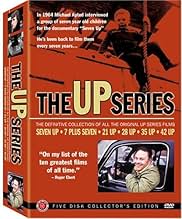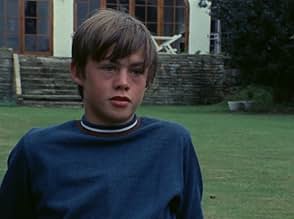7 Plus Seven
- TV Movie
- 1970
- 52m
IMDb RATING
7.9/10
3.4K
YOUR RATING
Director Michael Apted revisits the same group of British-born children after a seven-year wait. The subjects are interviewed as to the changes that have occurred in their lives during the l... Read allDirector Michael Apted revisits the same group of British-born children after a seven-year wait. The subjects are interviewed as to the changes that have occurred in their lives during the last seven years.Director Michael Apted revisits the same group of British-born children after a seven-year wait. The subjects are interviewed as to the changes that have occurred in their lives during the last seven years.
- Awards
- 1 nomination total
Bruce Balden
- Self
- (as Bruce)
Jacqueline Bassett
- Self
- (as Jackie)
Symon Basterfield
- Self
- (as Symon)
Andrew Brackfield
- Self
- (as Andrew)
John Brisby
- Self
- (as John)
Peter Davies
- Self
- (as Peter)
Suzanne Dewey
- Self
- (as Suzy)
Charles Furneaux
- Self
- (as Charles)
Nicholas Hitchon
- Self
- (as Nicholas)
Neil Hughes
- Self
- (as Neil)
Lynn Johnson
- Self
- (as Lindsay)
Paul Kligerman
- Self
- (as Paul)
Susan Sullivan
- Self
- (as Susan)
Tony Walker
- Self
- (as Tony)
Michael Apted
- Self - Narrator
- (uncredited)
Michelle Murphy
- Self (age 7, with Tony)
- (uncredited)
Featured reviews
This is not at all to put down the first entry in the "Up" Series by Michael Apted, Seven Up, but if you were to first go to this film- 7 Plus Seven- you actually would not be missing that much in the story lines of the children profiled. This is because Apted does something very smart in how he structures the material in this segment of the series, when all the children interviewed before when seven are now fourteen. He makes sure that the audience, who may need to be reminded who everyone is (at the time this was made, remember, things weren't re-aired frequently on TV, so many may have forgotten by seven years past), by simply just taking footage from the first segment of the Up Series and putting one interview following the previous one. It's not being lazy and relying on past clips, but a very precise form of counterpoint.
We see this as Apted unfolds the interviews with subjects like Bruce, Jackie, Suzanne, Nick, Charles, Lynn, all of them are here, and we see how specifically they've grown in physical appearance and voice, yes, but also in attitude and outlook. Apted asks similar questions from before, like "What do you want to be when you grow up?" Things like that, or 'what, if anything, do you watch on TV', and then it transitions into deeper, heavier questions that the kids, as when they were seven (far more articulate than many parents would ever give credit for) can at least try to tackle. Love, politics, religion, race, the state of Britain, hippies, nothing is really too far off limits to ask these kids, and we get a full spectrum of something very elemental: who are these people, if only in profile?
Apted is asking specific questions and getting honest answers- sometimes awkward, like when asked about girlfriends and boyfriends, but then again they are fourteen after all, that dastardly age to be- and its all framed about what was said in the past and what's said in the present. Another asset is the style; before it was black and white, looking like a very long newsreel story for movie theaters, and now it's in color, albeit faded over time, and the difference is striking (not to mention the intensity of the camera in some instances, as in 1963 Apted wanted to capture the rambunctious side of seven years olds).
While I'm not sure if 7 Plus Seven ranks as one of the best documentaries ever, and frankly I still hold out hope for any of the others in the series to top it, it does pose some of the best use of juxtaposition in a documentary I've ever come across. It's about growth, perspective, and innocence fading and changing, with more yet to come.
We see this as Apted unfolds the interviews with subjects like Bruce, Jackie, Suzanne, Nick, Charles, Lynn, all of them are here, and we see how specifically they've grown in physical appearance and voice, yes, but also in attitude and outlook. Apted asks similar questions from before, like "What do you want to be when you grow up?" Things like that, or 'what, if anything, do you watch on TV', and then it transitions into deeper, heavier questions that the kids, as when they were seven (far more articulate than many parents would ever give credit for) can at least try to tackle. Love, politics, religion, race, the state of Britain, hippies, nothing is really too far off limits to ask these kids, and we get a full spectrum of something very elemental: who are these people, if only in profile?
Apted is asking specific questions and getting honest answers- sometimes awkward, like when asked about girlfriends and boyfriends, but then again they are fourteen after all, that dastardly age to be- and its all framed about what was said in the past and what's said in the present. Another asset is the style; before it was black and white, looking like a very long newsreel story for movie theaters, and now it's in color, albeit faded over time, and the difference is striking (not to mention the intensity of the camera in some instances, as in 1963 Apted wanted to capture the rambunctious side of seven years olds).
While I'm not sure if 7 Plus Seven ranks as one of the best documentaries ever, and frankly I still hold out hope for any of the others in the series to top it, it does pose some of the best use of juxtaposition in a documentary I've ever come across. It's about growth, perspective, and innocence fading and changing, with more yet to come.
The second film in the "Up" series, "7 Plus Seven" catches those darling seven-year-olds at the awkward, self-conscious age of fourteen, which based on this film is evidently a universal. The film is cut between footage from "Seven Up" and footage from seven years later, which is at first jarring since cuteness quickly becomes smugness, and the like. Although, as predictable of the age, the Q & A approach chosen for the first film often feels like pulling teeth, certain key traits and moods of the children in this one will likely dictate far more about what's to come in future installments than could be conceived from volume one. This is a brilliant series of films that is just getting revved up with 1970's "7 Plus Seven'.
Preliminary confession-- i've only seen the first two installments, seven up and 7 plus seven. But I'm expecting the ensuing chapters to be far more interesting than 7 plus seven, which was plagued by the unavoidable fact that the subjects were all in the most wretched throes of self-conscious adolescence. made the film very difficult to watch. i might also blame the filmmaker-- perhaps he was so used to the open, honest confessions that he was able to pry from seven year olds that he just didn't do the necessary legwork in making sure that his 14 year old subjects were comfortable enough to interview. maybe he didn't anticipate the resentment the subjects felt towards HIM for making them sit there and interview. while 14 year olds CAN be self-conscious, they can also be motor mouths if they are put in the proper environment. i'm hoping to like the next installments much more.
The 'Up Series' represents one of the most fascinating and unusual uses of film in cinema history - a documentary life-long chronicle of the lives of 14 people starting at 7 years old, revisiting them every seven years through age 49 (so far).
While I could quibble, wishing for a bit more depth here and there (especially with the women, where there's a bit too much emphasis on love and marriage at the expense of all else), it's really an astounding, moving, frightening and uplifting document. There's no way to watch this remarkable series of films without reflecting deeply on one's own life, and how you have changed (and stayed the same) over your own lifetime.
While Michael Aped deserves every bit of credit he's received for this amazing piece of cultural anthropology, it's important to note the first film, 7 Up,was actually directed by Paul Almond, and Apted was a that point a researcher for the project.
While I could quibble, wishing for a bit more depth here and there (especially with the women, where there's a bit too much emphasis on love and marriage at the expense of all else), it's really an astounding, moving, frightening and uplifting document. There's no way to watch this remarkable series of films without reflecting deeply on one's own life, and how you have changed (and stayed the same) over your own lifetime.
While Michael Aped deserves every bit of credit he's received for this amazing piece of cultural anthropology, it's important to note the first film, 7 Up,was actually directed by Paul Almond, and Apted was a that point a researcher for the project.
Director Michael Apted was a simple research assistant in the first one. He would be the driving force for the series from now on. The kids are now 14 year olds, and some of them are fully in their awkward teen stage.
When you see Nicholas and Suzy, they are painfully awkward. It's actually hard to watch. It's like torturing little puppies. When Suzy's dog kills the rabbit, it was actually a welcome break from the intrusion. The class separation is still there as the 3 prep boys move on to their upper crust education. And Tony is fully into his jockeying goal. The boys and girls are moving on with their lives.
The production value is better than the first. We are now moving into a TV movie documentary whereas the first one is a black and white TV show. I do wish for better sound quality. Sure we're getting the teenage mumbling, but maybe subtitles would be helpful.
When you see Nicholas and Suzy, they are painfully awkward. It's actually hard to watch. It's like torturing little puppies. When Suzy's dog kills the rabbit, it was actually a welcome break from the intrusion. The class separation is still there as the 3 prep boys move on to their upper crust education. And Tony is fully into his jockeying goal. The boys and girls are moving on with their lives.
The production value is better than the first. We are now moving into a TV movie documentary whereas the first one is a black and white TV show. I do wish for better sound quality. Sure we're getting the teenage mumbling, but maybe subtitles would be helpful.
Did you know
- TriviaMichael Apted was an assistant director and researcher on Seven Up! (1964). Here, he steps in to the director's chair, vacated by Paul Almond. Apted would go on to direct all the rest of the films, and indeed would be the name associated with the series.
- Quotes
Himself - Narrator: Are you happier now than you were then?
- ConnectionsEdited into 42 Up (1998)
Details
Contribute to this page
Suggest an edit or add missing content


































